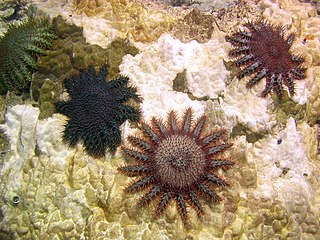 W
WAcanthaster is a bitypic genus of large and venomous starfish placed in its own family, Acanthasteridae. Its two members are known as crown-of-thorns starfish. Acanthaster are native to Coral reefs in Indo-Pacific region. They are a contributor to coral reefs degradation because at high density they consume a large amount of live coral.
 W
WAporometridae is a monotypic family of crinoids, the only genus being Aporometra, which contains three species, all endemic to the seas around Australia.
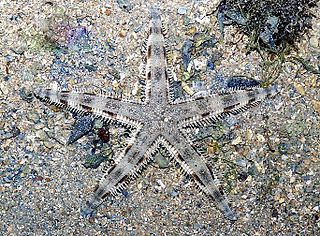 W
WArchasteridae is a family of starfish found in shallow waters in the tropical Indo-Pacific region. The genus Astropus, previously included in this family, is now included in the genus Archaster with the single species, Astropus longipes, being accepted as Archaster lorioli Sukarno & Jangoux, 1977.
 W
WThe Asteriidae are a diverse family of Asteroidea in the order Forcipulatida. It is one of three families in the order Forcipulatida.
 W
WThe Asterinidae are a large family of sea stars in the order Valvatida.
 W
WAsterodiscididae is a family of starfish. Members of the family have five short tapering arms and a wide disc. The family was first described by the Australian zoologist F.W.E. Rowe in 1977.
 W
WAsteropseidae is a family of sea stars. Members of the family have relatively broad discs and five short tapering arms.
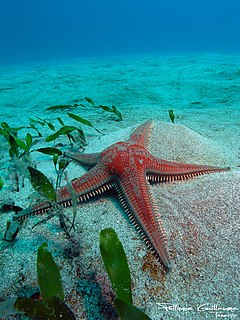 W
WThe Astropectinidae are a family of sea stars in the order Paxillosida. Usually, these starfish live on the seabed and immerse themselves in soft sediment such as sand and mud.
 W
WBathycrinidae is a family of echinoderms in the class Crinoidea. It contains the following genera and species:Bathycrinus Wyville Thomson, 1872 Bathycrinus aldrichianus Wyville Thomson, 1877 Bathycrinus australis AH Clark, 1907 Bathycrinus australocrucis McKnight, 1973 Bathycrinus carpenterii (Danielssen & Koren, 1877) Bathycrinus gracilis Wyville Thomson, 1877 Bathycrinus mendeleevi Mironov, 2008 Discolocrinus Mironov, 2008 Discolocrinus thieli Mironov, 2008 Monachocrinus AH Clark, 1919 Monachocrinus aotearoa McKnight, 1973 Monachocrinus caribbeus (AH Clark, 1908) Monachocrinus mortenseni Gislén, 1938 Monachocrinus paradoxus (AH Clark, 1909) Monachocrinus recuperatus (Perrier, 1885) Monachocrinus sexradiatus AH Clark, 1919 Naumachocrinus Naumachocrinus hawaiiensis AH Clark, 1973
 W
WThe Notomyotida are an order of sea stars containing at least 75 species in eight genera of the monotypic family, Benthopectinidae.
 W
WBourgueticrinidae is a family of crinoids, containing 2 genera's.
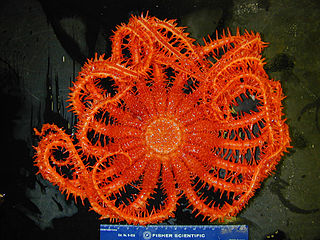 W
WThe Brisingidae are a family of starfish found only in the deep sea. They inhabit both the Atlantic and Pacific Oceans at abyssal depths, and also occur in the Southern Ocean and around Antarctica at slightly shallower depths.
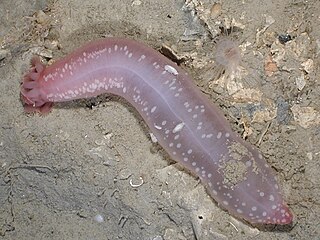 W
WChiridotidae is a family of sea cucumbers.
 W
WCidaridae is a family of sea urchins in the order Cidaroida.
 W
WComasteridae is a family of crinoids.
 W
WComatulidae is a family of comatulid crinoids. Since 2015, it replaces the family Comasteridae.
 W
WCucumariidae is a family of sea cucumbers, marine animals with elongated bodies, leathery skins and tentacles that are found on the sea bed.
 W
WThe Echinasteridae are a family of starfish in the monotypic order Spinulosida. The family includes eight genera and about 133 species found on the seabed in various habitats around the world.
 W
WElpidiidae is a family of deep-sea sea cucumbers.
 W
WThe Freyellidae are a family of deep-sea-dwelling starfish. It is one of two families in the order Brisingida. The majority of species in this family are found in Antarctic waters and near Australia. Other species have been found near New Zealand and the United States.
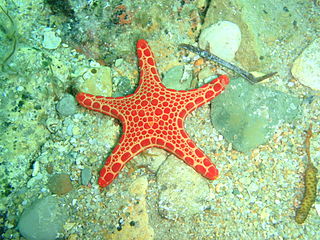 W
WGoniasteridae constitute the largest family of sea stars, included in the order Valvatida. They are mostly deep-dwelling species, but the family also include several colorful shallow tropical species.
 W
WGuillecrinidae is a small family of echinoderms in the class Crinoidea, and contains the following genera and species below.
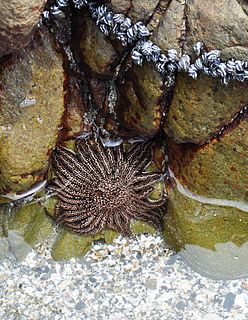 W
WThe Heliasteridae are a family of Asteroidea in the order Forcipulatida. It includes two genera: Heliaster from the East Pacific, and Labidiaster from southernmost South America, Antarctica and subantarctic oceans.
 W
WHolothuriidae is a family of sea cucumbers, a type of echinoderm.
 W
WIsocrinidae is one of four extant families of crinoids in the order Isocrinida.
 W
WIsselicrinidae is one of four extant families of crinoids in the order Isocrinida.
 W
WKorethrasteridae is a family of starfish in the order Velatida. It contains the following genera and species:Genus Korethraster Korethraster hispidus Genus Peribolaster Peribolaster biserialis Peribolaster folliculatus Peribolaster lictor Peribolaster macleani Genus Remaster Remaster gourdoni Remaster palmatus
 W
WLaetmogonidae is a family of sea cucumbers.
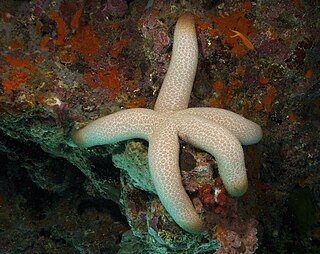 W
WThe Mithrodiidae is a family of starfish in the order Valvatida.
 W
WMyriotrochidae is a family of sea cucumbers.
 W
WMyxasteridae is a family of deep-sea velatid sea stars containing nine species in three genera.
 W
WThe Ophidiasteridae are a family of sea stars with about 30 genera. Occurring both in the Indo-Pacific and Atlantic Oceans, ophidiasterids are greatest in diversity in the Indo-Pacific. Many of the genera in this family exhibit brilliant colors and patterns, which sometimes can be attributed to aposematism and crypsis to protect themselves from predators. Some ophidiasterids possess remarkable powers of regeneration, enabling them to either reproduce asexually or to survive serious damage made by predators or forces of nature. Some species belonging to Linckia, Ophidiaster and Phataria shed single arms that regenerate the disc and the remaining rays to form a complete individual. Some of these also reproduce asexually by parthenogenesis.
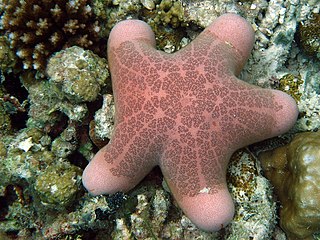 W
WThe Oreasteridae are a family of sea stars in the class Asteroidea.
 W
WPelagothuriidae is a family of deep-sea swimming sea cucumbers. They are somewhat unusual in appearance, in comparison with other sea cucumbers, having numerous appendages, including conical papillae and leaf-like tentacles. Most of them are benthopelagic, which means that they are able to swim for a time from the bottom : the species Pelagothuria natatrix is the only true pelagic holothurian ; it looks like a jellyfish. Most members of the order inhabit deep-sea environments, like Enypniastes.
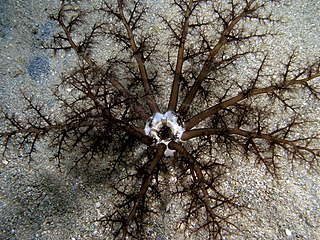 W
WPhyllophoridae is a family of sea cucumbers, marine invertebrates with elongated bodies, leathery skins and feeding tentacles.
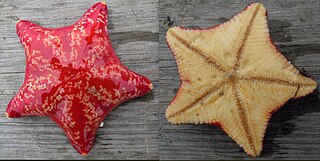 W
WPoraniidae is a family of starfishes in the order Valvatida.
 W
WThe pourtalesiids (Pourtalesiidae) are a family of irregular sea urchins that live in the deep sea. They are secondarily bilateral-symmetrical and like other representatives of the taxon Holasteroida they lack the lantern of Aristotle, which is typical for many other sea urchins. The genus Pourtalesia was named after Louis-François de Pourtalès who first collected these animals while dredging at a depth of 600 m. The family is known already from the Upper Cretaceous (Maastrichtian) and is distributed worldwide.
 W
WProisocrinus ruberrimus is a species of crinoids that is in the monotypic genus Proisocrinus. The genus is in the monotypic family Proisocrinidae
 W
WPsolidae is a family of sea cucumbers, marine animals with elongated bodies, leathery skins and tentacles that are found on the sea bed.
 W
WPterasteridae is a family of sea stars in the order Velatida, consisting of eight genera.
 W
WSclerodactylidae is a family of sea cucumbers, marine invertebrates with elongated bodies, leathery skins and tentacles.
 W
WThe Solasteridae are a family of sea stars.
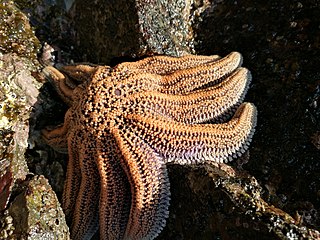 W
WThe Stichasteridae are a small family of Asteroidea in the order Forcipulatida. Genera were formerly unassigned, or in the family Asteriidae.
 W
WSynaptidae is a family of sea cucumbers that have no tube feet, tentacle ampullae, retractor muscles, respiratory trees, or cuvierian tubules. They also lack radial canals of the water-vascular system, with only the circumoral ring present.
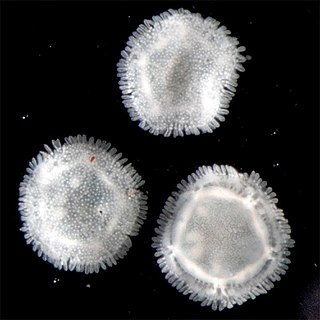 W
WSea daisies make up an unusual group of deep-sea taxa belonging to the phylum Echinodermata, with three species described in the genus Xyloplax.
 W
WThe Zoroasteridae are one of three families of Asteroidea in the order Forcipulatida. It contains seven living genera and one extinct genus.